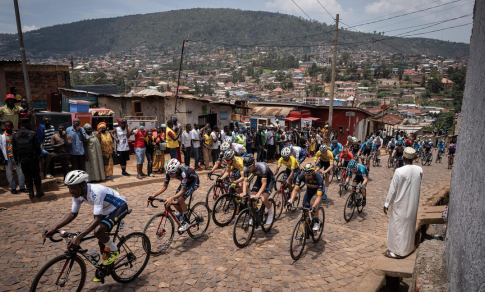
The Tour du Rwanda, one of Africa’s most prestigious cycling races, continues to captivate the world with its vibrant landscapes, competitive atmosphere, and top-tier international talent. However, as the 2025 edition of the race approaches, concerns surrounding safety and security in the region have surfaced, raising questions about the safety of both participants and spectators.
Despite these concerns, the cyclists taking part in the event have expressed unwavering confidence in their safety, emphasizing the rigorous security measures in place and the experience of local organizers in handling such large-scale international events.
In recent years, Rwanda has enjoyed relative peace and stability, with its government working hard to position the country as a safe destination for tourism, business, and international events. However, the security situation in neighboring countries, such as the Democratic Republic of the Congo (DRC), has fluctuated, causing some international observers to raise concerns over potential cross-border issues that could affect Rwanda’s security.
Additionally, the global security climate has become increasingly volatile, with terrorist threats and political instability becoming more prominent in some parts of Africa. These concerns have been echoed by some media outlets and potential participants, questioning whether the race will proceed without incident.
The organizers of the Tour du Rwanda have reassured cyclists and the public alike, stressing that security has always been a top priority for the event. Rwanda’s government, led by President Paul Kagame, has worked closely with both local and international agencies to ensure that the race will be safe for all involved. Security personnel are regularly stationed along the route, and a comprehensive plan is in place to address any potential threats.
The race’s organizers also noted that the event’s history and its reputation as one of Africa’s premier cycling competitions speak volumes about the country’s ability to host large, international sporting events. Over the years, Rwanda has built a strong track record of successfully managing sporting events such as the African Nations Championship (CHAN) in football and the World Road Cycling Championships.
The Rwandan government and local authorities have been instrumental in creating a secure environment for athletes and fans, says Jean-Claude Rukundo, the Race Director of the Tour du Rwanda. We have built strong relationships with international security experts to ensure that any risks are mitigated. The race will proceed with enhanced security measures, and all necessary precautions will be taken.
Despite the lingering concerns, many cyclists participating in the event remain confident in Rwanda’s ability to safeguard their well-being. International teams, including riders from Europe, Africa, and beyond, have expressed their trust in the country’s security apparatus, citing previous editions of the Tour du Rwanda as examples of how well the event has been managed.
Professional cyclist Mohamed Amin, a leading rider from the Middle East, remarked: I’ve raced in Rwanda before, and I’ve always felt safe. The people here are incredibly welcoming, and the infrastructure is top-notch. The organizers are thorough, and the government takes safety seriously. I’m looking forward to competing again this year.
Similarly, several African riders from neighboring nations, such as Kenya, Uganda, and Ethiopia, emphasized their trust in Rwanda’s safety protocols. Rwanda has become a beacon of stability in the region, said Kenyan cyclist Samuel Ndungu. The government has worked hard to make sure we can race without worrying about security issues. I’m excited to race here once again.
Beyond the safety concerns, the Tour du Rwanda is also viewed as an important event for the country’s tourism industry, as it draws thousands of visitors to the region. It also serves as a critical platform for promoting cycling in East Africa, a region that is quickly becoming one of the world’s hotbeds of cycling talent.
For Rwandans, the event holds a particular significance, as it showcases the country’s remarkable recovery from the dark days of the 1994 genocide. The race highlights not only the country’s scenic beauty and improved infrastructure but also its ability to bring together diverse cultures and people through sport.
Hosting this race is a source of immense pride for us, said Marie-Helene Mukashyaka, a Rwandan spectator and local cycling fan. It shows the world how far we’ve come. We are no longer a country defined by our past, but a place that has worked hard to create a safe and thriving environment for all.
As the Tour du Rwanda continues to grow, organizers are determined to ensure that the event remains a cornerstone of African cycling. With each year, more international teams and sponsors are becoming involved, reflecting the race’s growing prestige and importance within the global cycling calendar.
The future of the race seems bright, with plans in place to expand its international presence. As African cycling continues to rise, events like the Tour du Rwanda play an essential role in providing riders with the exposure they need to make an impact on the world stage. Rwanda’s commitment to the sport, combined with the confidence of the international cycling community, ensures that the race will continue for many years to come.
In conclusion, while security concerns will always be a consideration, the unwavering confidence expressed by both the cyclists and the organizers points to a bright future for the Tour du Rwanda. With the safety of all participants as a top priority, the race is set to continue as one of Africa’s premier sporting events, bringing together athletes and fans from all over the world to celebrate the spirit of cycling and the resilience of the Rwandan people.

